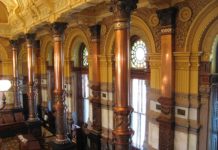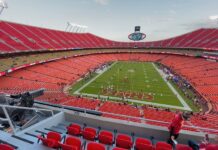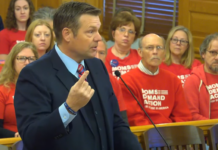The Kansas House on Tuesday approved an economic development incentive worth an estimated $1.3 billion to land what could be one of the biggest economic development projects in state history.
Described at one point as a “train wreck” after it passed the Senate, the legislation emerged victorious on an 80-41 vote after lawmakers worked throughout the week to clean up the bill to make it more workable and politically palatable.
It now goes to the Senate on Wednesday for final approval.
The bill provides the incentives to qualified firms that agree to invest at least $1 billion in the state within a five-year period. It also extends incentives to five of the company’s suppliers under certain circumstances.
While the legislation applies to all economic development prospects, it was an outgrowth of an economic development project that is holding out the prospect of bringing a $4 billion manufacturing plant that would employ 4,000.
Officials have never revealed the company, although some legislators know the prospect because they agreed to sign nondisclosure agreements.
The bill appeared to be on the ropes after it was passed by the Senate and included provisions that would have phased out the state’s corporate income tax and removed a section that made one of the tax credits for the project nonrefundable.
The House went to work, cleaning up the bill to get it through the process to meet a strict deadline the state is racing to meet. The company is expected to make a decision about the location of its plant next month.
Senate Ty Masterson said Tuesday he planned to ask his chamber to concur with the House amendments when it takes up the bill Wednesday.
“Frankly, I have not seen all the changes, but my understanding is that they’re acceptable,” Masterson said.
An estimate developed by House Republicans shows that the incentive is worth about $1.3 billion, including $900 million in refundable tax incentives over 10 year.
Early in the day Tuesday before the incentive was approved, Lt. Gov. David Toland took exception to the Republicans’ estimate but didn’t dispute the numbers directly.
“Failing to take into account $2.5 billion annually in new economic activity, along with presenting projections that are only based on worst-case scenarios paints a picture that shows none of the benefits to Kansas,” Toland said in a statement.
“This misleading depiction puts the state at risk of losing an unprecedented economic opportunity,” he said.
“We can get this done by avoiding politics as usual and working together in a bipartisan fashion,” he said.
The House made a key change on the House floor that allowed those refundable tax credits to be paid out over a period of less than 10 year so long as it’s approved by the State Finance Council.
The Commerce Department wanted it paid out over three years, but lawmakers feared that the state budget couldn’t afford those payments.
In committee, Republican state Rep. Sean Tarwater, chair of the Commerce Committee, locked those refunds in to a period over 10 years, although that was believed to be a poison pill for the legislation and a deal breaker for the project.
On the floor, Tarwater agreed to allow flexibility and lower that refund period to something under 10 years if it’s approved by the Finance Council.
Other components of the bill include:
- A refundable an investment tax credit of up to 15% of the business’ investment. The state would refund the tax credit over 10 years.
- A one-time 0.5% cut in the corporate income tax each time a project comes to Kansas under the proposed bill. The bill limits projects receiving the incentives to one per calendar year. The bill also sunsets on May 1, 2024.
- A payroll tax refund capped at 7.5% for 10 years. The State Finance Council would need to approve any higher refund, but only up to 10%.
- A 5% refundable investment tax credit to the suppliers up to their first $50 million in capital investment. The suppliers would receive another percentage point of tax credits for every $10 million they invest up to $100 million.
- A reimbursement for suppliers for training costs up to $250,000 a year per supplier. The primary manufacturing company is eligible for up to $5 million annually in reimbursements for training costs.
- Creates a $10 million matching incentive fund for the company to help with the relocation costs for employees who move from another state and make Kansas their primary residence. The proposal calls for the state to match up to $1 million a year for up to 10 years for relocation costs.
- Claws back a percentage of benefits received if it relocates outside of the state in the
11th through 15th years following the year the manufacturer entered into the agreement with the state. The company also must commit to repay any benefits if it’s found to be in breach of its agreement with the state.
















